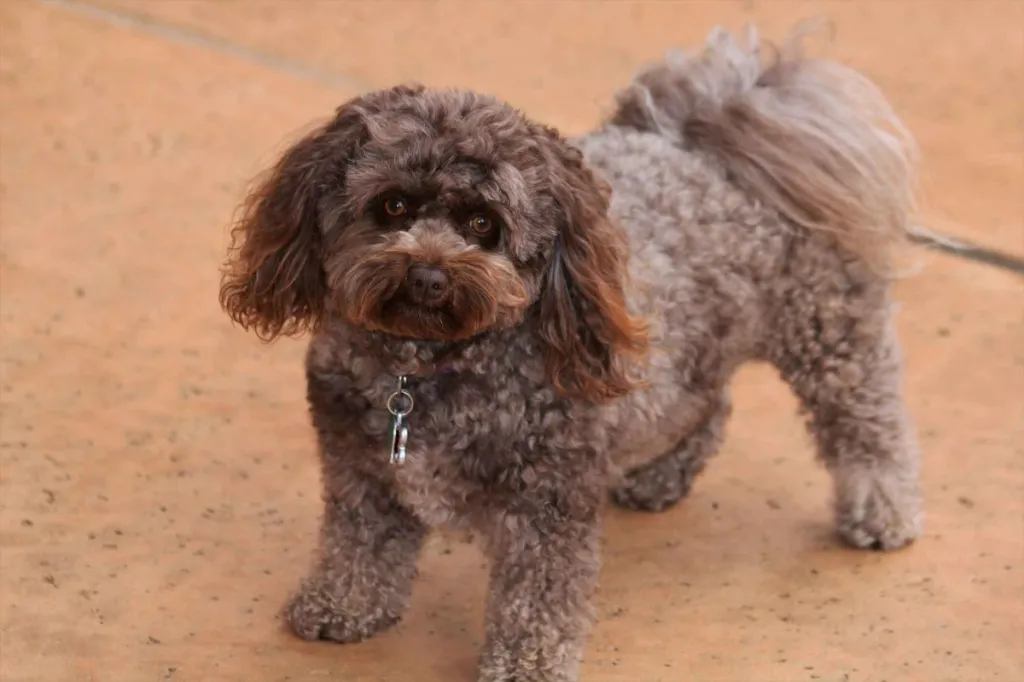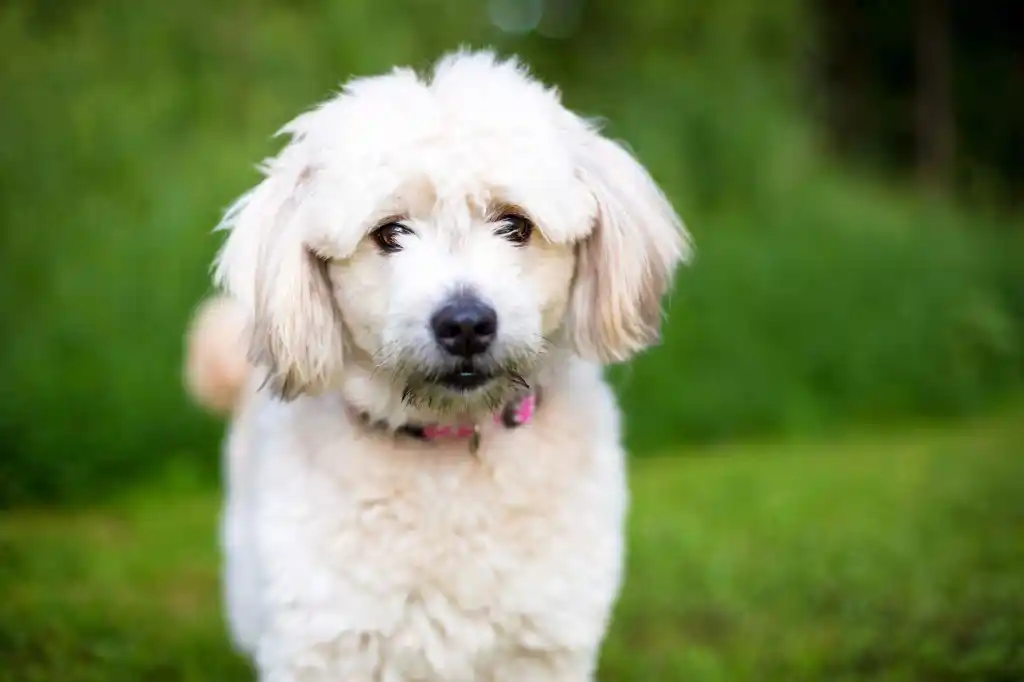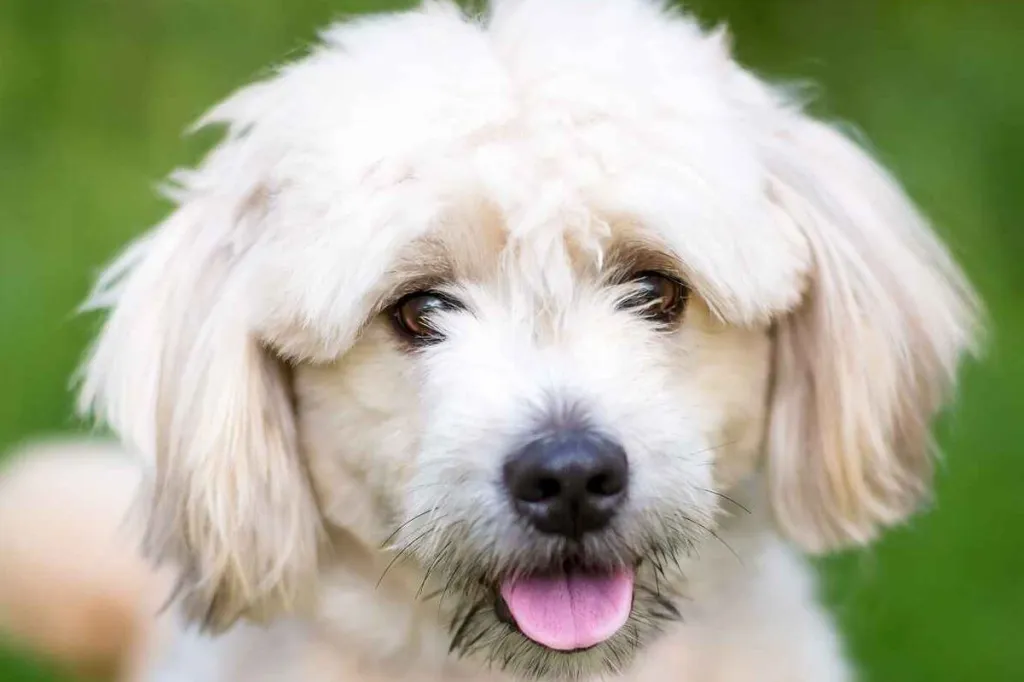The Pomapoo is a small-sized, hypoallergenic cross between a Pomeranian and a Toy or Miniature Poodle. With their fluffy coats, expressive eyes, and petite size, Pomapoos are irresistibly cute companions. Known for their playful and affectionate nature, these designer dogs thrive on companionship and enjoy being the center of attention. Their adaptable temperament makes them well-suited for various living situations, from apartments to larger homes, as long as they receive ample love and attention.
In terms of grooming, Pomapoos require regular brushing to maintain their soft, fluffy coats and prevent matting. They may inherit the Poodle’s low-shedding coat, making them suitable for allergy sufferers. Additionally, Pomapoos benefit from moderate exercise and mental stimulation to keep them happy and healthy. Interactive play sessions and short walks are usually sufficient to meet their activity needs.
Pomapoo characteristics
- Height: 8 to 10 inches at the shoulder
- Weight: 5 to 15 pounds
- Lifespan: 12 to 15 years
Coat and color variations
Pomapoos may inherit the Poodle’s soft, curly, hypoallergenic coat, while others have a wavy coat combining Pomeranian softness with Poodle curls, or even straight fur resembling the Pomeranian. Their colors range from classic solid black, white, and cream to warm apricot, rich chocolate brown, and sable with a mix of dark and light tones, as well as party colors blending two or more shades.
Physical traits and appearance
Size and build:
- Size: Small dogs, typically weighing between 5 to 15 pounds and standing about 8 to 12 inches tall at the shoulder.
- Build: Compact and sturdy with a well-proportioned body.
Facial features:
- Head: Rounded skull with a slightly tapered muzzle..
- Eyes: Large, round, and dark, often giving them an alert and friendly expression.
- Ears: Floppy or semi-erect ears that may be covered in fur, resembling either the Pomeranian or the Poodle.
Coat texture and color:
- Coat: Varies in texture from curly and wavy to straight, with a medium to long length, depending on the genetic influence.
- Color: Wide range of colors, including solid black, white, cream, apricot, brown, sable, and various party colors combining multiple shades.
How big does a Pomapoo get?
A Pomapoo is typically miniature or small in size, weighing between 5 to 15 pounds and standing about 8 to 12 inches tall at the shoulder. Their size can vary based on the specific genetic influence of their Pomeranian and Poodle parents, with some Pomapoos leaning more towards the smaller Pomeranian size and others potentially being larger, depending on whether they inherit traits from a Standard or Miniature Poodle.
Pomapoo personality
Pomapoos are known for their friendly, affectionate, and lively personalities. They often inherit the playful and outgoing nature of both Pomeranians and Poodles. Because Pomapoos are intelligent and eager to please, they are relatively easy to train. They are also quite playful with a curious nature, making them great playmates for families. Despite their small size, Pomapoos can exhibit a bold personality and may act as little guardians. They bond closely with their human families and tend to seek companionship, so they do best in environments where they receive plenty of love and attention.
Temperament and behavior
- Affectionate: Loves to cuddle and be close to family members.
- Playful: Enjoys games and interactive playtime, making them great companions for children.
- Intelligent: Quick learners who respond well to training and mental stimulation.
- Sociable: Friendly with people and often gets along well with other pets.
- Curious: Naturally inquisitive, exploring their environment and seeking out new experiences.
- Alert: Tends to bark at strangers or unfamiliar noises, showcasing a protective instinct.
- Energetic: Requires regular playtime and exercise to keep them happy and healthy.
- Companionship-Seeking: Prefers to be around people and may experience separation anxiety if left alone for long periods.
Training and socialization
Early socialization and positive reinforcement training are crucial due to their intelligence and potential stubbornness. Of course, their intelligence allows them to pick up commands quickly, so early training is key to establishing good behavior from the start. Use praise, treats, and affection to reward desired behavior. Pomapoos respond well to positive reinforcement, and this approach will keep them motivated and engaged.
Training tips:
- Be Consistent: Consistency is crucial in training. Use the same commands and routines to avoid confusion. This helps your Pomeranian Poodle mix understand what is expected of them.
- Keep Training Sessions Short and Fun: Pomapoos are intelligent but can lose interest if training sessions are too long or repetitive. Keep sessions short (10-15 minutes) and engage with varied activities.
- Mental Stimulation: Incorporate puzzle toys, obedience training, and interactive games into their routine to challenge their mind. A bored Pomapoo can become restless or destructive. Once basic obedience is established, teach more advanced commands or tricks. Their intelligence makes them excellent candidates for agility training, fetch, or scent games.
Pomapoo care
Caring for a Pomapoo involves providing a balanced lifestyle that includes regular exercise, mental stimulation, and social interaction. These dogs thrive on companionship and should be integrated into family activities to keep them happy and engaged. Daily walks, play sessions, and interactive toys are essential to meet their physical and mental needs. Regular veterinary check-ups, vaccinations, and preventive treatments for parasites are necessary to maintain their overall well-being.
Pomapoo grooming needs
Regular brushing is essential to prevent matting and tangling, especially if they inherit the longer fur from their Pomeranian parent. Bathing should be done as needed, usually every 4 to 6 weeks, using a gentle dog shampoo to keep their coat clean and healthy. Regular grooming appointments with a professional groomer can help maintain their coat and overall appearance. Additionally, it’s important to attend to their nails, ears, and teeth to ensure complete grooming care.

How to groom a Pomapoo
- Curly Coats: Pomapoos with tight, Poodle-like curls need frequent brushing and trimming to prevent matting and maintain their soft, hypoallergenic texture. This coat type usually requires professional grooming every 4-6 weeks.
- Wavy Coats: Pomapoos with a wavy coat that blends Pomeranian and Poodle features need regular brushing 2-3 times per week to prevent tangles and keep their fluffy appearance. They may need professional grooming every 6-8 weeks.
- Straight Coats: Pomapoos with straight, Pomeranian-style fur require less frequent brushing, about once a week. However, their longer coat still needs periodic trimming every 8-12 weeks to look neat and prevent matting.
Regardless of coat type, all Pomapoos benefit from regular bathing every 4-6 weeks to keep their skin and fur healthy. Nail trims, ear cleaning, and teeth brushing should also be done monthly as part of their grooming routine.
Check for skin issues
As you groom, check their skin for any signs of irritation, redness, or bumps. If you notice anything unusual, consult a vet.
Flea, tick, and parasite control
Keep up with flea and tick prevention treatments, especially if your Pomapoo spends much time outdoors. Regular grooming allows you to spot parasites early.
Early acclimation is key
Getting your Pomapoo accustomed to grooming procedures from a young age makes the process easier and more enjoyable for both of you. Handle their paws frequently, examine their mouth and ears, and reward them for good behavior during grooming sessions. This positive foundation sets the stage for stress-free veterinary exams and handling throughout their lives.
Nutrition and feeding
An ideal Pomapoo diet should be formulated for a small breed with moderate energy. They tend to gain weight if they are overfed, so you should stick to a regular feeding schedule and not leave food out during the day.
- Puppies: Feed 3-4 small meals per day of a puppy-specific formula to support their rapid growth and development.
- Adults: Feed 2 meals per day of all-life-stages or adult dog food, adjusting portions based on their age, activity level, and body condition. A typical adult Pomapoo may need 1-1.5 cups of dry food per day.
- Senior Dogs: Switch to a senior or lower-calorie dog food formula as Pomapoos reach their golden years, continuing with 2 meals per day but reducing portions.
In addition to their regular meals, Pomapoos enjoy the occasional healthy treat, but these should make up no more than 10% of their daily caloric intake. Appropriate treats include small pieces of cooked chicken, carrots, apples, or commercial training treats.

Health issues
The Pomapoo breed is predisposed to some of the same conditions that the Pomeranian and Poodle also face. While most are generally healthy, some may be prone to a few health issues, which is why it is important to maintain good care and regular veterinary checkups. Some of the more common health problems Pomapoos suffer from include:
- Patellar Luxation: Patellar luxation, a condition where the kneecap (patella) dislocates from its normal position, can affect Pomapoos, as it can with many small and toy breeds. The patella normally slides up and down in a groove in the femur when a dog moves their hind leg. Patellar luxation occurs when this mechanism is disrupted, leading to the kneecap moving out of place. In Pomapoos, as in other small breeds, this condition is often congenital, meaning it is present from birth.
- Tracheal Collapse: Tracheal collapse is a health concern that can affect Pomapoos, particularly due to their small size and delicate build. This condition involves the weakening or collapsing of the trachea, the windpipe that allows air to pass in and out of the lungs. In Pomapoos, as in other toy breeds, tracheal collapse is often attributed to genetic factors and can be exacerbated by factors such as obesity, respiratory infections, or pulling on a leash.
- Epilepsy: While epilepsy can occur in dogs of any breed, including Pomapoos, it’s essential to be aware that there may be a genetic predisposition to the condition in some lines. Epilepsy in dogs is characterized by recurrent seizures, and it can be challenging to determine a specific cause. In Pomapoos, as in other small breeds, genetic factors may contribute to the development of epilepsy, and it can manifest at various ages.
- Cataracts: Cataracts, a condition characterized by the clouding of the eye’s lens, can also affect Pomapoos, impacting their vision. While cataracts can develop in dogs of any age or breed, they are occasionally associated with genetic factors in certain breeds, including some small or toy breeds like the Pomeranian and Poodle, which contribute to the Pomapoo’s lineage. In Pomapoos, cataracts can lead to a gradual deterioration of vision, ranging from mild impairment to complete blindness if left untreated.
Pomapoo rescue groups
It may be hard to find a breed-specific rescue for Pomapoos because they are a mixed breed. However, you may want to try Pomeranian or Poodle breed-specific rescues, as they often care for mixes, as well. Here are some rescues you can try:
- PAWSITIVELY POM RESCUE
- Carolina Poodle Rescue
- Pixies and Paws Rescue
- Southern California Pomeranian Rescue
If you choose to purchase a Pomapoo, finding a reputable dog breeder is crucial. Reputable breeders are committed to breeding healthy, well-socialized puppies that will make great companions. They will screen their breeding stock for health problems, socialize their puppies from a young age, and provide you with lifetime support. On the other hand, backyard breeders are more interested in making a profit than in producing healthy, well-adjusted puppies. To avoid contributing to inhumane breeding practices, always research reputable breeders or adopt from rescues.
How much are Pomapoo puppies?
Pomapoo puppies from a reputable breeder typically range in price from $1500 to $2,500, with the average price being around $1,800 to $2,100.















